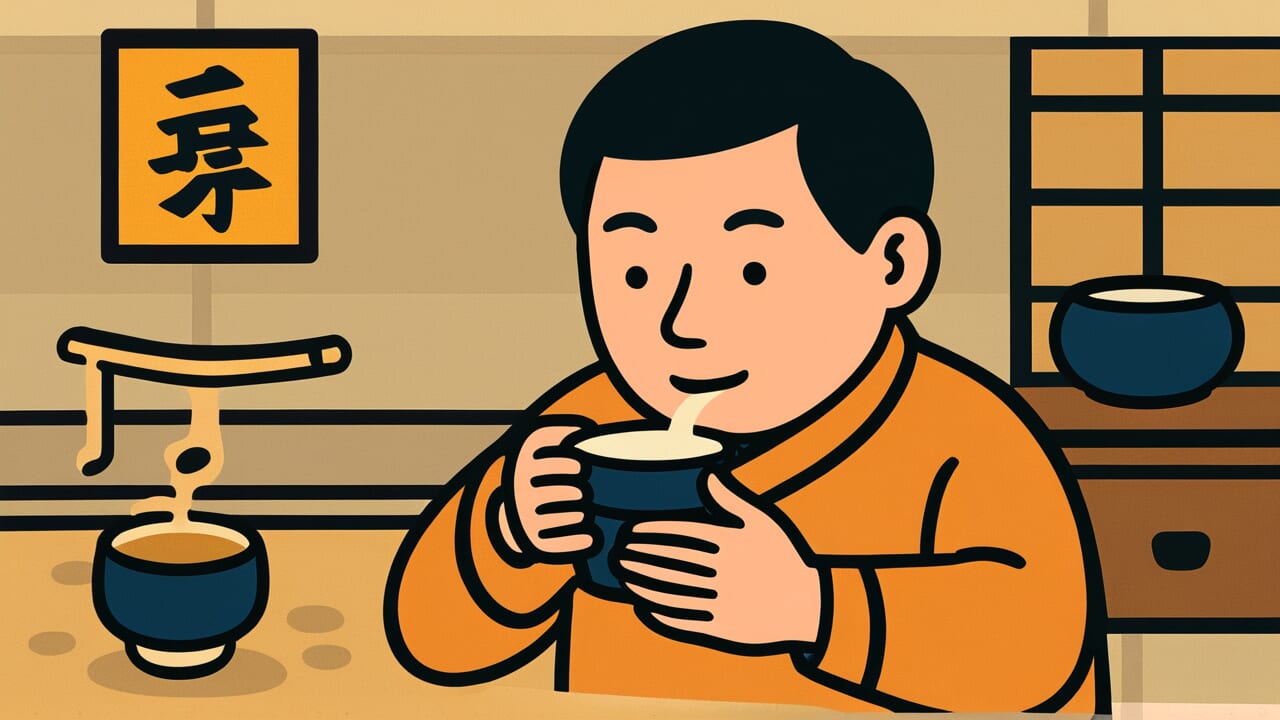How to Read “A cup of sake for the moment”
Sokuji ippai no sake
Meaning of “A cup of sake for the moment”
“A cup of sake for the moment” is a proverb that describes valuing small, immediate rewards over larger benefits that might come in the future.
It shows how people often choose certain pleasures right now rather than waiting for uncertain rewards later.
This proverb explains the behavior of people who prioritize short-term satisfaction. Even when they know that investment or effort will pay off greatly in the future, they choose the small enjoyment available right now.
It captures this human tendency in a simple way.
Today, this saying is often used as a contrast when discussing the importance of long-term thinking. Should we plan carefully for the future, or should we enjoy the present?
This eternal dilemma is expressed through the familiar example of a cup of sake. It’s a deeply human proverb that everyone can relate to.
Origin and Etymology
There don’t seem to be clear written records about the origin of this proverb. However, we can make interesting observations from how the phrase is constructed.
The word “sokuji” means “this very moment” or “right now.” The phrase “a cup of sake” was likely chosen as a symbol of modest pleasure.
Why sake specifically? In Japanese culture, sake has long been an everyday pleasure. It was easy to obtain and offered immediate enjoyment.
It wasn’t an expensive treasure or a distant dream. It represented certain happiness right in front of you.
This proverb probably emerged from the everyday experiences of common people. While others talked about great future profits, someone said, “A drink today is more certain than that.”
It contains a kind of realistic life philosophy.
Choosing small joys available now over uncertain future wealth can be viewed critically. But it can also be seen as a practical way of living.
Either way, this phrase has been passed down through generations. It expresses a fundamental human desire: the thirst for certainty.
Usage Examples
- He’s the type who chooses a cup of sake for the moment, prioritizing today’s fun over saving money
- I started studying for a certification, but like a cup of sake for the moment, I can’t refuse my friends’ invitations
Universal Wisdom
The proverb “A cup of sake for the moment” offers deep insight into fundamental human desires. Why do people choose small pleasures right now over greater happiness in the future?
The answer is that the future is inherently uncertain. No one knows what will happen tomorrow.
There’s no guarantee you’ll actually receive that reward a year or ten years from now. Meanwhile, the cup of sake in front of you is certain.
You can reach for it, taste it, and feel the joy it brings.
Humans are creatures who seek certainty. Choosing certain small happiness over uncertain great hope is, in a way, a rational decision.
This choice might be rooted in survival instinct.
What if you sacrifice the present for a distant future, and that future never comes? This fear pulls us back to “now.”
This proverb has been passed down for so long because it touches on human nature. Even when reason tells us to endure for the future, emotion seeks present joy.
This conflict is a fundamental characteristic of human existence. It never disappears, no matter how times change.
When AI Hears This
The human brain calculates value with steep discounting as time increases. For example, given “10,000 yen today” versus “15,000 yen in one year,” most people choose today’s 10,000 yen.
However, given “10,000 yen in five years” versus “15,000 yen in six years,” more people choose the latter, even though it’s the same one-year difference.
This inconsistent judgment is expressed mathematically as hyperbolic discounting. The curve shows that value decreases extremely sharply when time is near.
What’s interesting is that this proverb captures the special nature of time-zero with the word “sokuji” (immediate). The hyperbolic discounting curve rises sharply as it approaches time zero.
In other words, “right now” is given mathematically abnormal value. Even a trivial pleasure like a cup of sake triggers the brain’s reward system more strongly than any great future benefit, if obtained immediately.
This mechanism is a product of evolution. In the hunter-gatherer era, when tomorrow’s food was uncertain, brains that prioritized fruit right in front of them survived.
Modern human brains run on the same program. That’s why we eat cake when dieting. That’s why we impulse-buy when we should save.
People in the Edo period knew nothing about neuroscience or behavioral economics. Yet they accurately expressed the overwhelming weight of “this very moment” in human decision-making in just seven characters.
Lessons for Today
What this proverb teaches modern people is the importance of objectively examining our own choice patterns. Are you choosing a cup of sake for the moment right now?
Modern society is full of temptations. Open your smartphone and there’s infinite entertainment available instantly.
We choose content we can enjoy right now over studying or working hard for the future. This isn’t necessarily bad.
However, if it’s becoming a habit, it’s worth stopping to think about it.
What matters is balance. You don’t need to sacrifice everything for the future. Enjoying the present is also an important part of life.
But ask yourself: are all your choices becoming “a cup of sake for the moment”?
Sometimes you need the courage to pass up small temptations today for greater joy in the future. When you can make that choice, you’ll have more control over your own life.
After all, today’s choices create tomorrow’s you.



Comments